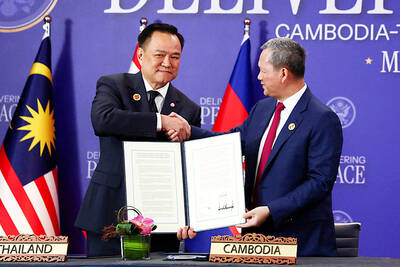Wearing a pair of black-rimmed glasses and a red T-shirt, an eight-year-old Chinese boy is logged in for an online coding lesson — as the teacher.
Vita set up a coding tutorial channel on the Chinese video streaming site Bilibili in August and has so far garnered nearly 60,000 followers and more than 1 million views.
He is among a growing number of children in China who are learning coding even before they enter primary school.

Photo: AFP
The trend has been fueled by parents’ belief that coding skills will be essential for Chinese teenagers given the government’s technological drive.
“Coding is not that easy, but also not that difficult — at least not as difficult as you have imagined,” said Vita, who lives in Shanghai.
The little boy uses his channel to patiently take his students — who are mostly children older than him and young adults — step-by-step through an Apple-designed coding app called Swift Playgrounds.
Explaining as he goes, he sometimes deliberately makes mistakes to help show common errors to avoid.
“When I am teaching, I am learning new things at the same time,” Vita said.
China has been making huge investments in robotics and artificial intelligence (AI), with the government in 2017 issuing an AI development plan that suggested programming courses be taught in primary and secondary schools.
China published its first AI textbook last year, while eastern Zhejiang Province listed programming as one subject for its college entrance examination.
For Vita it was his father, Zhou Ziheng (周自恆), who has been his main support, editing his videos and helping to run the channel. Zhou, a freelance translator of scientific and technology books, started to teach his son how to write code when he was five years old.
“I learned coding when I was young, so I always believed that Vita learning coding at this age was something normal,” he said.
When Vita was four, they started off by playing some coding-related games together, which used icons to replace code.
After seeing that Vita played these games very well, Zhou decided to help him work on some real code.
This summer, Vita surprised his father by successfully rewriting the code in an app that did not work in an updated system by himself.
“I suggested to him to record how he rewrote these codes,” said Zhou, and the idea for online classes was born.
Most comments on Vita’s online videos express amazement that he can write code and even teach others at such a young age.
“I just learned how to use the computer when I was eight,” wrote one.
Parents who do not have the skills to help can send their children to coding agencies, which are booming thanks to demand from China’s middle-class families looking for the best skills for their children.
The value of China’s programming education market for children was 7.5 billion yuan (US$1 billion) in 2017, but is set to exceed to 37.7 billion yuan by next year, according to Analysys, a Chinese Internet analysis firm.
“China’s programming education in public school starts very late [compared with developed countries], so our after-school tutorial agency makes up for this shortage,” said Pan Gongbo (潘公博), general manager of Beijing-based Tongcheng Tongmei, a coding education center.
The school’s youngest student is three years old.
For children under six, the agency offers a special program that includes activities such as Lego building, which also uses coding knowledge and skills.
Children at six or seven are fully capable of learning coding in cognitive development, Pan said.
“Do not underestimate the learning speed of children. In some of our courses, they learn even faster than our adults,” he said.
Ten-year-old Ji Yingzhe has been studying the coding language Python for half a year at the agency — before that, he took a semester-long course on fundamental robot building, which he felt was too simple.
“The codes have already been written for you, and all you have to do is to organize these [code blocks] in order,” he said.
Ji’s father sent him to learn programming because he was spending a lot of time playing video games.
There was a new rule at home: Ji could only play the games that he created himself.
Ji has almost finished writing a simple version of the popular game Plants vs Zombies.
In November, Vita competed in a coding competition for primary students, held by the Shanghai Computer Industry Association.
He spent two months learning the coding language C++ for the competition, with the help of his father, going all the way to the final despite being among the youngest participants.
In terms of what the future holds, Zhou said that it would depend on Vita’s interest and ability — but he wants to keep his son down-to-earth.
“I told him: ‘you haven’t done anything remarkable,’” said Zhou. “This is just one step of [his] coding learning.”
Vita says he is happy just to have fans and followers.
“Coding is a long-term challenge, [but] download the app and you can start learning now,” he said.

Shamans in Peru on Monday gathered for an annual New Year’s ritual where they made predictions for the year to come, including illness for US President Donald Trump and the downfall of Venezuelan President Nicolas Maduro. “The United States should prepare itself because Donald Trump will fall seriously ill,” Juan de Dios Garcia proclaimed as he gathered with other shamans on a beach in southern Lima, dressed in traditional Andean ponchos and headdresses, and sprinkling flowers on the sand. The shamans carried large posters of world leaders, over which they crossed swords and burned incense, some of which they stomped on. In this

‘NO COUNTRY BUMPKIN’: The judge rejected arguments that former prime minister Najib Razak was an unwitting victim, saying Najib took steps to protect his position Imprisoned former Malaysian prime minister Najib Razak was yesterday convicted, following a corruption trial tied to multibillion-dollar looting of the 1Malaysia Development Berhad (1MDB) state investment fund. The nation’s high court found Najib, 72, guilty on four counts of abuse of power and 21 charges of money laundering related to more than US$700 million channeled into his personal bank accounts from the 1MDB fund. Najib denied any wrongdoing, and maintained the funds were a political donation from Saudi Arabia and that he had been misled by rogue financiers led by businessman Low Taek Jho. Low, thought to be the scandal’s mastermind, remains

Near the entrance to the Panama Canal, a monument to China’s contributions to the interoceanic waterway was torn down on Saturday night by order of local authorities. The move comes as US President Donald Trump has made threats in the past few months to retake control of the canal, claiming Beijing has too much influence in its operations. In a surprising move that has been criticized by leaders in Panama and China, the mayor’s office of the locality of Arraijan ordered the demolition of the monument built in 2004 to symbolize friendship between the countries. The mayor’s office said in

FIGHTING CONTINUES: Thai military dropped 40 bombs on border areas, Cambodia said, while Bangkok said Phnom Penh launched heavy attacks and damaged homes Cambodia yesterday accused Thailand of intensifying its bombardment of disputed border areas, even as officials from the two countries attend a multi-day meeting aimed at negotiating an end to deadly clashes. The neighbors’ long-standing border conflict reignited this month, shattering an earlier truce and killing more than 40 people, according to official counts. About 1 million people have also been displaced. Cambodian and Thai officials were in their third day of talks at a border checkpoint, with ministers of defense from the two countries scheduled to meet today. However, the Cambodian Ministry of National Defense said Thailand’s military carried out a heavy